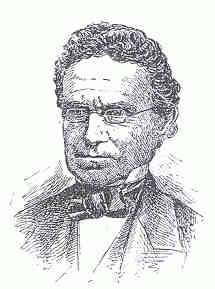William George Crosby

(1805-1881)
Maine

The National Cyclopaedia of American Biography
311 (New York:
James T. White & Company, 1896)(Vol. 6)
George Bancroft Griffith (ed.), The Poets of Maine
76 (Portland, Maine: Elwell, Pickard & Co., 1888):
Born in Belfast in 1805, and died there March 21. 1881. Governor
of Maine in 1853 and 1854, by election of the Legislature. Gov.
Crosby was admitted to the bar in Boston, and practiced there
from 1826 to 1828, when he returned to Belfast. In 1846 Mr. Crosby
was elected Secretary of the Maine Board of Education, and held
this important and honorable office three years. Subsequently,
on retiring from the office of chief magistrate, he resided for
a while in Boston, editorially connected with Mr. Littell in some
of his publications. On returning to Belfast, he resumed his profession,
and held high rank at the bar. In 1866 he received the appointment
of collector for the district, his last public position. He was
a man of cultivated literary tastes, and his Commencement part
at Bowdoin College was a poem. He published a series of fifty-two
papers, entitled, "Annals of Belfast for Half a Century,
by an Old Settler," and delivered one of a popular course
of lectures. In 1870 he received the degree of LL.D. from the
college, and was a time on its Board of Directors.
The National Cyclopaedia of American Biography
311-312 (New York: James T. White & Company, 1896)(Vol.
6):
Crosby, William George, seventeenth governor of Maine
(1853-55), was born in Belfast, Me., Sept. 10, 1805. . . . His
father, Judge William Crosby, was an eminent jurist, and his
mother was Sally, daughter of Benjamin Davis of Billerica, Mass.
Young Crosby received his preparatory education at Belfast Academy,
and entered Bowdoin College, where he was graduated in 1823,
being the first person born in Belfast to receive a college
education. Among his classmates were such eminent men as Franklin
Pierce, William Pitt Fessenden, Henry W. Longfellow, Nathaniel
Hawthorne, John S.C. Abbott, and others of genius and distinction.
Mr. Crosby studied law with his father and began to practice
in Boston, where he remained two years. He returned to Belfast
in 1828, and continued to reside there permanently. From the
first of his career, Mr. Crosby became prominently identified
with the politics of his state. He was a Whig . . . . He was
an active participant in the campaign for "Harrison and
Reform," and in 1844 was a delegate to the national convention
which nominated Henry Clay, and was one of his warmest supporters.
. . . In 1950 he was nominated by his party for governor of
the state, but was defeated, and again in 1852, when, owing
to the division in the Democratic party through the agitation
of the Maine law and free soil issues, there was no choice of
the people. The election was thrown into the legislature, and
after a long struggle he was elected governor. He was re-elected
in the same manner in the following year. . . . While at college
he contributed fugitive poems to the newspapers, which were
afterward published in book form. He was also the author of
"Poetical Illustrations of the Athenaeum Gallery." He died
in Belfast, March 21, 1881.
Governor
Willam George Crosby
Representative Men of Maine
(Portland, Maine, The Lakeside Press, 1893)
William George Crosby, Poetical Illustrations of
the Athenaeum Gallery of Paintings (Boston: True and Greene, 1827) [online text]
William George Crosby, "Annals of Belfast for
Half a Century," in Early Histories of Belfast, Maine (Camden,
Maine: Picton Press, 1989)
|
